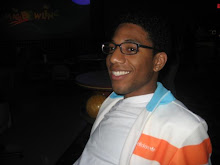 I must say that I was disappointed by CNN's Black In America 2. When I hear such a loading tittle like Black In America, I'm automatically looking for this loading, all encompassing documentary series that is going to show what it's like to be black in this country. Albeit, the experience has a number of perspectives and vantage points, I feel that we all should be able to see ourselves, hear out story, and be able to "amen" some aspect of the presentation.
I must say that I was disappointed by CNN's Black In America 2. When I hear such a loading tittle like Black In America, I'm automatically looking for this loading, all encompassing documentary series that is going to show what it's like to be black in this country. Albeit, the experience has a number of perspectives and vantage points, I feel that we all should be able to see ourselves, hear out story, and be able to "amen" some aspect of the presentation.This documentary, however, was a presentation of the black image in the white mind. It seemed more like Soledad O'Brien and her producers went through their personal cell phones and Facebook friend list and simply called people they knew so they could throw this show together.
The documentary starts out with a story about comedian Chris Rock’s wife, Malaak Compton-Rock, who heads up a nonprofit called The Angel Rock Project. The project is geared towards at-risk youth in Bushwick and strives to develop the leadership abilities of the youth through global.
The organization had an interview process last year selected 30 youth ambassadors to attend a service trip to Johannesburg, South Africa. The tripe was definitely a great thing for these kids and i am sure it's probably the nicest thing anyone has ever done for them but I'm concerned that the goal that Mrs. Rock set out to accomplish was not achieved. This service learning trip was a great starting point and catalyst for change, but there was little to no follow up with these kids. There is no way that a child who cannot read, or refuse to do what it takes to do well in school will be a future leader.
The little boy that CNN selected to profile during this segment was so shy, so withdrawn, and his primary focus was basketball. This was a free trip for him. I felt like this segment was simply a free plug for Malaak's charity to make herself feel better at the expense of these kids. There was no follow up with the kids; no accountability.
The segment on the elite black America's was sickening. Elitism, whether it includes or excludes Blacks is elitism. This segment soured the whole program for me. No matter how well the people featured have done for themselves financially, they still have to work for a living. Albeit doctors, judges, and lobbyist, they're working to maintain a lifestyle. The people that the show likened them to have old money don't have to work at all as their wealth is generational. They have more money then they know what to do with! In my opinion, elitism is a negative thing and this segment went against the whole premise of this documentary. Elitism, whether it includes or excludes Blacks is elitism.
I've got more to say but I'm going to have to follow up... In the meantime, I'm re-reading the following..
Our Kind of People: Inside America's Black Upper Class by Lawrence Otis Graham
Blue-Chip Black: Race, Class, and Status in the New Black Middle Class by Karyn R. Lacy







